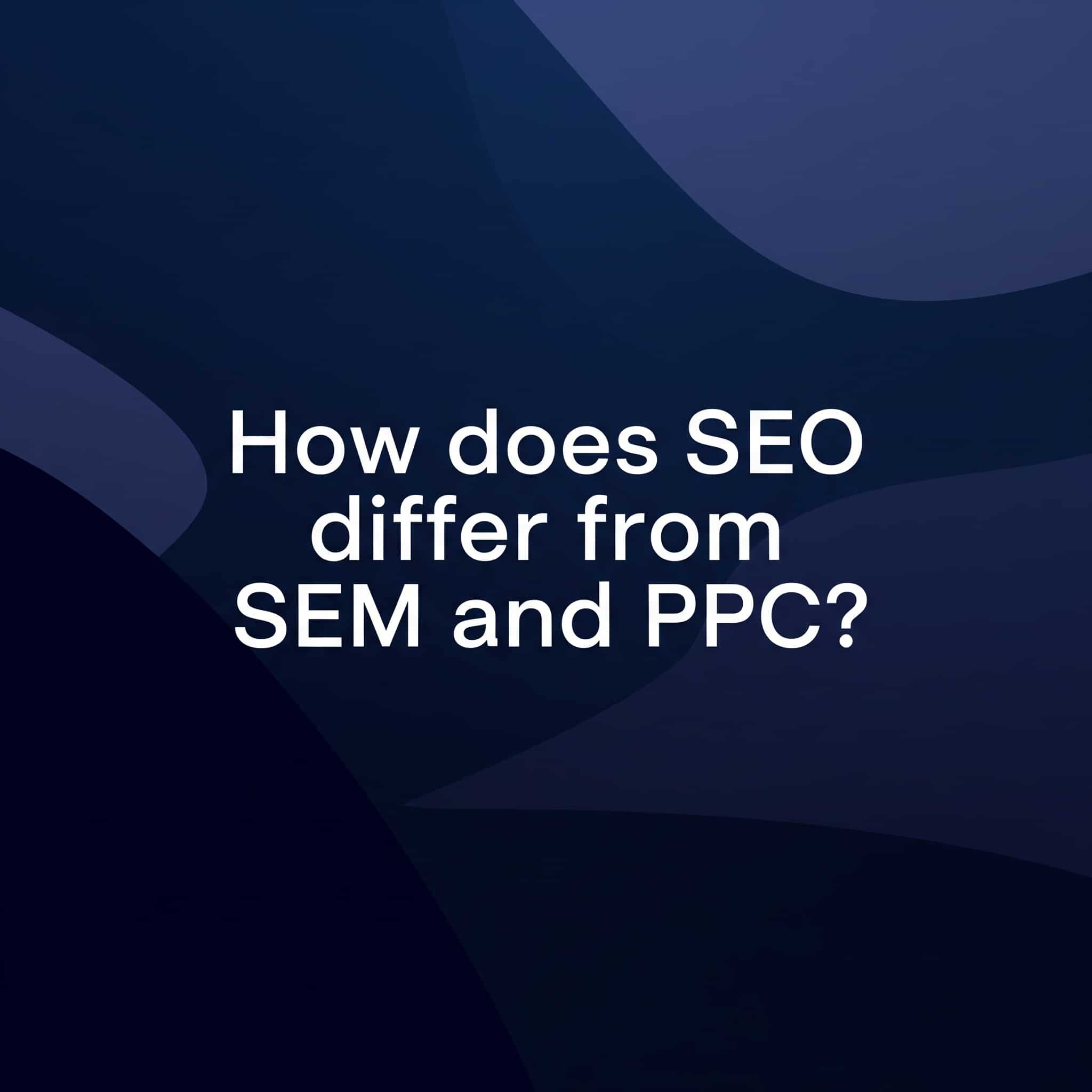Written by Gemini
I. TL;DR (Too Long; Didn’t Read)
Confused by all the marketing jargon? Let’s break it down: SEO (Search Engine Optimization) is about earning free, organic traffic from search engines. PPC (Pay-Per-Click) involves paying for ads to appear in search results. SEM (Search Engine Marketing) is the broader strategy that uses both SEO and PPC to drive growth. The main difference comes down to paying for visibility (PPC) versus earning it organically (SEO). Understanding this is key to making smart marketing choices!
This article will clear up what’s SEO, SEM, and PPC, clearly explaining how they differ and, most importantly, helping you figure out the best approach for your business to get more out of search engines like Google and Bing.
II. Introduction: Cutting Through the Search Marketing Confusion
If you’re a business owner trying to navigate the digital world, you’ve likely been bombarded with acronyms: SEO, SEM, PPC. It can feel like alphabet soup! But understanding these terms isn’t just about sounding smart; it’s crucial for making informed decisions that can significantly impact your website traffic, lead generation, and ultimately, your bottom line.
So, let’s clear up the confusion and explore what each of these means for your business.
III. Defining the Terms: SEO, PPC, and SEM Unpacked
Before we compare, let’s get our definitions straight.
- What is SEO (Search Engine Optimization)? SEO is all about improving your website’s visibility in the organic (non-paid) search results on search engines like Google and Bing. When people search for keywords related to your business, you want your website to appear as high up as possible on the SERP (Search Engine Results Page) without directly paying for that spot.
- Focus: Earning traffic through relevance and authority.
- Key Activities: This involves a range of activities, including in-depth keyword research, crafting SEO-friendly content, on-page optimization (like improving titles and meta descriptions), technical SEO (ensuring your site is crawlable and fast), and off-page SEO (like building backlinks).
- Goal: To build long-term, sustainable traffic by establishing trust and relevance with both users and search engines. If you’re just starting, our beginner’s guide to SEO is a great place to learn more.
- Jargon Busters:
- Organic Traffic: Visitors who come to your website from unpaid search results.
- SERP: Search Engine Results Page – the page you see after you type a query into Google or Bing.
- What is PPC (Pay-Per-Click)?PPC is a form of online advertising where you pay a fee each time one of your ads is clicked. The most common platforms for PPC are Google Ads and Microsoft Advertising (for Bing). These ads typically appear at the top or bottom of the SERPs, clearly marked as “Ad” or “Sponsored.”
- Focus: Buying immediate visibility and targeted traffic.
- How it Works: You bid on specific keywords you want your ads to show up for. When a user searches for that keyword, an ad auction occurs, and if your bid and ad quality are competitive, your ad is displayed. You only pay when someone actually clicks on your ad.
- Goal: To drive highly targeted traffic to your website quickly, often for specific campaigns, promotions, or to capture high-intent users.
- Jargon Busters:
- Bidding: The process of telling a search engine how much you’re willing to pay for a click on a specific keyword.
- Ad Auction: The real-time process search engines use to decide which ads to show and in what order.
- What is SEM (Search Engine Marketing)?SEM is the most comprehensive of the three terms. Traditionally, and for the clearest understanding, SEM is the overarching discipline of using search engines to market your business. This means SEM effectively uses both SEO and PPC as its core tactics to increase website visibility and achieve marketing objectives.
- Focus: Leveraging search engines (both paid and organic channels) to reach potential customers.
- Relationship: Think of SEM as the entire orchestra, with SEO being the string section and PPC being the brass section – both play different but crucial parts in the overall performance. While some marketers today informally use “SEM” to refer mainly to paid search activities, understanding it as the umbrella term (SEO + PPC) helps clarify how all these pieces fit into a broader SEO and search marketing strategy.
- Goal: To achieve broader business objectives like increased brand awareness, lead generation, and sales by strategically using a mix of paid and organic search engine tactics.
IV. SEO vs. PPC: The Core Differences at a Glance
Now that we know what they are, let’s look at how SEO and PPC directly compare:
- Cost:
- SEO: While often called “free traffic,” SEO requires a significant investment in time, expertise, content creation, and tools. The cost is indirect but ongoing.
- PPC: You pay directly for each click. You set a budget, and once it’s depleted, your ads stop running. Costs can vary wildly based on keyword competitiveness.
- Time to Results:
- SEO: It’s a marathon, not a sprint. Seeing significant organic ranking improvements and traffic can take weeks, months, or even longer, especially in competitive niches.
- PPC: Results can be almost immediate. Once your campaigns are set up and approved, your ads can start showing and driving traffic within hours.
- Position on SERP:
- SEO: Aims for rankings within the organic search results, which appear below the paid ads.
- PPC: Ads typically appear in prominent positions at the top, bottom, or sometimes the side of the SERP, clearly marked as sponsored.
- Sustainability & Longevity:
- SEO: The benefits can be long-lasting. Once you achieve good rankings, you can receive “free” traffic for an extended period, though ongoing effort is needed to maintain them.
- PPC: Traffic is immediate but stops as soon as your budget runs out or you pause your campaigns. It’s like a tap – turn it off, and the water stops.
- Traffic Potential & Targeting:
- SEO: Can drive a high volume of continuous traffic across a wide range of keywords once established. Targeting is primarily achieved by creating content relevant to user search intent.
- PPC: Offers very granular targeting options, including specific keywords, demographics, location, time of day, and device. Traffic volume is directly tied to your budget.
- What You Pay For:
- SEO: You’re investing in expertise, strategic planning, content creation, technical optimization, and relationship building (for links).
- PPC: You’re directly paying for each click that brings a visitor to your site.
V. SEM: The Power of an Integrated Strategy (SEO + PPC)
While SEO and PPC are different, they aren’t mutually exclusive. In fact, they work best when they work together as part of a comprehensive SEM strategy.
Here’s how they complement each other:
- Maximize SERP Coverage: Appearing in both paid and organic results increases your overall visibility and brand presence.
- Data Synergy: Insights from PPC keyword performance (like conversion rates) can inform your SEO keyword strategy, and vice-versa.
- Target Different Funnel Stages: PPC can be great for bottom-of-funnel, high-intent keywords, while SEO can build awareness and trust at the top and middle of the funnel.
- Remarketing Power: Target users with PPC ads after they’ve visited your site organically.
- Testing Ground: PPC can be used to quickly test the effectiveness of keywords or landing pages before investing heavily in long-term SEO efforts.
VI. Which Should You Choose? SEO, PPC, or Both (SEM)?
The “best” approach depends entirely on your specific business needs, goals, resources, and timeline. Here are some guiding questions:
- What are your primary business goals? (e.g., immediate sales, long-term brand building, lead generation).
- What’s your marketing budget? (PPC requires a direct ad spend budget).
- How quickly do you need to see results?
- What is your industry and how competitive is it?
- What’s the current state of your website and its existing authority?
Here’s a general guide:
- Focus Primarily on SEO When:
- You’re building a long-term, sustainable brand and online presence.
- Your budget for direct ad spend is limited (though SEO is an investment, not free).
- You’re in an industry where trust and authority are paramount (SEO helps build this over time).
- Your business model relies on generating a high volume of organic traffic through valuable content.
- Focus Primarily on PPC When:
- You need to generate traffic and leads quickly (e.g., for a new product launch, event, or promotion).
- You want to target very specific demographics or locations.
- You want to test offers, keywords, or landing pages rapidly.
- Your website is new and has little to no organic visibility yet.
- You operate in a highly competitive market where ranking organically for key terms is extremely difficult short-term.
- Opt for an Integrated SEM Approach (SEO + PPC) When:
- You want to maximize your overall search engine visibility and reach.
- You want to leverage the strengths of both paid and organic search.
- You have the budget and resources to manage both effectively.
- This is often the most effective approach for most businesses seeking sustained, scalable growth. Using data from tools like Google Search Console and Bing Webmaster Tools can help refine both strategies.
VII. Conclusion: Making the Right Choice for Your Search Marketing
Understanding the difference between SEO, SEM, and PPC is the first step towards building a powerful search marketing strategy. There’s no single “right” answer – SEO offers long-term, sustainable growth, while PPC provides immediate, targeted visibility. SEM, as the overarching strategy, often involves a smart combination of both.
The key is to align your approach with your specific business goals, budget, and timeline. Knowing why your business needs a solid SEO strategy is fundamental, and from there, you can decide how PPC fits into your broader SEM picture.
Feeling unsure which path is best for your business or how to make SEO and PPC work together effectively? At NeedSEO, we specialize in demystifying search marketing and crafting tailored strategies that deliver real results. We can help you analyze your unique situation and implement the right mix to achieve your objectives. Get in touch with NeedSEO today for a personalized consultation on your search marketing strategy!







